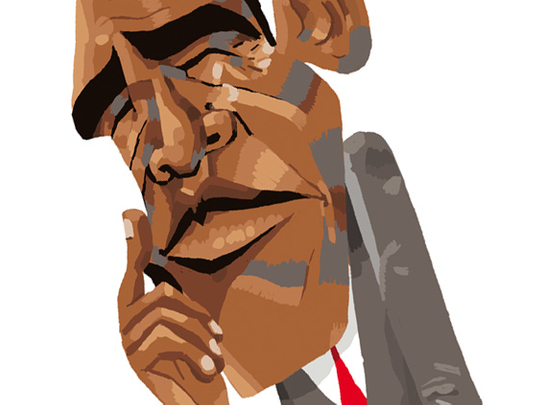
The question of the moment in American politics is this: is Barack Obama too even-tempered for his own good?
There is no small irony in this development; especially since it can be argued that Obama's calm demeanour and steady temper are the main reasons he is president today.
Back in the late summer of 2008 the campaign pitting Obama against John McCain was widely presumed to be too close to call. Then, in early September, America's economy plunged over a cliff, threatening to drag much of the rest of the world down with it. In those first key weeks of the financial crisis Obama exuded a sense of calm that was a striking contrast to McCain. For a time the Arizona senator seemed to come up with a new financial rescue plan every day, each of which seemed less well-considered than the last.
In late September McCain announced that he was "suspending" his campaign for the presidency. This was intended to be a dramatic gesture demonstrating seriousness of purpose, but was widely interpreted as a sign of desperation. When asked if he would suspend his campaign too, Obama pointedly refused, noting that in the real world we expect presidents to be able to handle more than one issue at a time.
There are, of course, other reasons why McCain lost the 2008 election, but, in retrospect, the financial crisis and the way the candidates dealt with it was the turning point of the fall campaign. It was a moment when Obama seemed steady while McCain was erratic. By staying steady the Illinois senator did much to ease doubts among those who wondered whether his relative youth and short time on the national stage rendered him not-quite-ready for the White House.
The lesson of the last few weeks, however, is that calm, low-key and thoughtful is not always what the country wants or needs.
Taking responsibility
Last week Obama finally confronted the growing perception that he is neither sufficiently engaged with nor sufficiently outraged by what he called the "unprecedented disaster" unfolding in the Gulf of Mexico, where a broken pipeline nearly two kilometres beneath the sea has been spewing out oil for more than a month.
"I take responsibility," he told a news conference. "It is my job to make sure that everything is done to shut this down."
Only the most partisan of naysayers could seriously believe that the president is not taking the crisis seriously. Obama's political problem arises from the fact that — in keeping with his personality — he has not been particularly emotive about it. Americans expect competent crisis management from their chief executives — but they also demand that presidents channel the national mood. This is especially the case when that mood is grief or, as it is now, anger.
It is fair to observe that a presidential temper tantrum directed at BP is not going to get the pipe fixed any sooner. That, however, is not the point. Because the American presidency is a job that has almost as much to do with ceremony as it does with the nuts-and-bolts aspects of governing, how the president is seen to react at moments like this is almost as important as what he actually does.
And, what, exactly, should Obama be doing? His political problem just now is that there is not, in fact, very much that he can do. On a technical level BP, the military (the Coast Guard, mainly) and a handful of government agencies are doing what little they can to staunch the flow of oil into the Gulf of Mexico.
So the administration is criticised for failing to ‘do something', even though it has precious little control over the actual crisis: it can supervise the clean-up and think through the long-term policy implications of this mess, but has fairly limited leverage over BP as the oil company seeks to plug the leak.
The problem Obama faces is mainly a longer-term policy one. Yes, the spill is a catastrophe. But is that an argument against all offshore drilling? Or an argument for tighter government regulation? All of the early signs are that Obama takes the latter view. This appalls his liberal base, but the president has always been a more centrist figure than either his most ardent supporters or his most vitriol-filled detractors would like to believe.
Before the policy, however, must come the empathy. Obama's immediate task is to convince Americans in general, and residents of the spill-affected states in particular, that he cares. Only then will he be able to get past his immediate political problems so that he can focus on making sure nothing like this ever happens again.
Gordon Robison, a writer and commentator who has lived in and reported on the Middle East for two decades, teaches political science at the University of Vermont.











